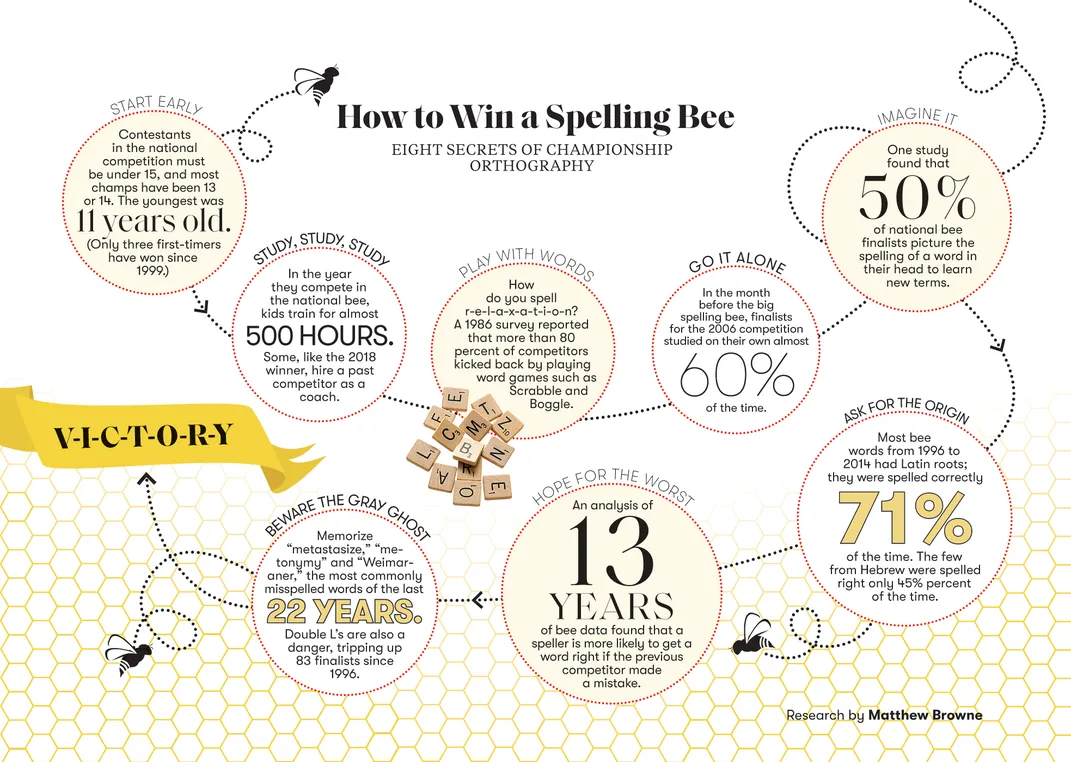The History of the Spelling Bee
Even in the age of autofill, America is still in love with the centuries-old tradition
:focal(2187x602:2188x603)/https://tf-cmsv2-smithsonianmag-media.s3.amazonaws.com/filer/ea/2e/ea2e5688-00c9-4bde-9ebe-a173a130b2c3/may2019_e17_prologue.jpg)
In May, hundreds of kids from all over the United States and a handful of other countries will arrive in Washington, D.C., having sacrificed many hundreds of hours of free time to a singular kind of intensive study. In the most extreme cases, they will have tried to memorize every word in a nearly 3,000-page dictionary. I know the work they have put into preparing for their big day and the pressure they will be feeling, because I was one of them.
In 1996, as a 12-year-old, I won my school spelling bee (I was home-schooled), a district bee and a grueling New York City regional finals under the bright lights of a large auditorium. Then I stood apprehensively on the stage of the Scripps National Spelling Bee in Washington for seven rounds, until I misspelled “erythema” (meaning skin redness). I thought it was spelled “errathema” like “error.”
The spelling bee is a curiously American spectacle in which our competitive spirit encounters the idiosyncrasies of the English language. Of course there was no such thing as proper spelling in English before the early 17th century, when the first English dictionaries emerged. But the language had adopted words from a wide variety of sources, and they could not be coerced into following one set of rules. At times, the relationship between a word’s spelling and its pronunciation is downright bizarre. One of my favorite examples is “ajimez” (a type of window in Arabic architecture); it is pronounced “ah-KEE-maith.” Given the degree of difficulty, correctness of language quickly became a sign of erudition. In class-conscious Britain, the focus was on correct pronunciation. (Think of Eliza Doolittle’s lessons in My Fair Lady.) In the United States, correct spelling was the thing.
The American obsession may have started with the Puritans, who emphasized the power of precisely written biblical phrases. By the mid-18th century, spelling competitions were common; Benjamin Franklin recommended their use in a 1750 proposal for a school. Recreational spelling challenges were fashionable in the 19th century for both adults and children. The Hoosier Schoolmaster, a best-selling novel in 1871, includes a hero who falls in love with a woman he is facing in a “spelling-match,” and Mark Twain mentions “spelling fights” in The Adventures of Tom Sawyer. It wasn’t until the mid-1870s that the term “bee”—which referred to a community social event with a common goal, such as a quilting bee—came into use, but the stakes in these competitions were high no matter what they were called. A popular poem of the era imagined a spelling bee between California gold miners that ended in a fight to the death. The word at issue: “eider-duck.”
Today’s spelling bees still enthrall people, even though spell check and autofill are constantly at our fingertips. If anything, the national spelling competition, held annually since 1925 (except during World War II), is more popular than ever, with the final rounds televised on ESPN and the whole ordeal captured in aw-shucks documentaries. Meanwhile, there are local charity spelling competitions galore and spelling bees in bars that seem to double as sobriety tests.
We love bees because they embody the ideal of American meritocracy. Each competitor stands alone and any one of them might win the battle of wits. It’s also, however, a rather fierce orthographic version of The Hunger Games. I remember looking at the contestants to my left and to my right and thinking, I will beat them. In the bee, you can win only if everyone else loses.
At the awards banquet held after the national bee, kids are told that there are no losers in this competition, only winners. But a handful of the finalists are seated on a stage, displayed as models to the others. When I attended in 1996, I didn’t get to sit on that stage.
In 1997, the last year I would be eligible, I set out to compete again. I rose before dawn every day to work on memorizing the entire dictionary. I won my way back to the finals. The two days of competition were tough, but I was energized. After 14 rounds, it was down to two of us, me and Prem Murthy Trivedi of New Jersey. I guessed “nomothetic” (relating to abstract statements or laws) and survived another round. Prem slipped on “analemma” (a plot of the position of the sun), so I had a chance to win, but I missed “dulcinea” (a sweetheart). We were both still in it. We continued on and on, longer than almost any other bee. Finally, Prem slipped again. I breathlessly shouted the letters of my last word: “E! U! O! N! Y! M! Euonym!” Then, with my narrow 90-pound frame, I hoisted the massive trophy over my head.
The national spelling bee taught me discipline and showed me what I could accomplish. But even as a kid the winner-take-all ethos bothered me. Elimination had hurt, and so did watching good friends miss. Some previous winners return to visit, and several even work as organizers or judges. I didn’t do that. Instead, I threw myself into things like soccer and software engineering. Like the bee, building software requires intense concentration and precision, but the accomplishments belong to the team. I’m relieved to have no more to gain from competitive spelling. But all that childhood practice means I hardly ever make a typo.


